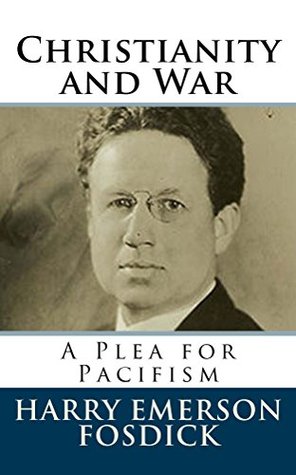- Bíblia
- Leia a Bíblia
- Versões da Bíblia
- Verso do dia
- Planos de Leitura
- Versos por Tópico
- Books of the Bible
- Imagens bíblicas
- Estude
- Comentários
- Concordâncias
- Dicionários
- Enciclopédias
- Sermões
- Bible Atlas & Maps
- BP Wiki
- Devocionais
- Devocionais de hoje
- Light of the World
- Todos os devocionais
- Inspirational Quotes
- Mais
- Picture Quotes
- Videos
- Inspirador
- Estudo da Bíblia
- O que a Bíblia diz
- Bible Q&As
- Daily Bread
- Bible by Genre
- Bible Stories
- Random Bible Verse
- Comunidade
- Store
Christianity and War: A Plea for Pacifism
by Harry Emerson Fosdick
All will agree that a sermon pleading for a Christian Con¬science About War, delivered in the Cathedral at Geneva, at the League of Nations Assembly Service, ought to have first place in any book. The occasion, the preacher and the theme made it memorable, alike for the opportunity and the magnifi¬cent manner in which the preacher met it—himself a “heretic,” denouncing war as the supreme social heresy of civilization. Never did the challenging words of Jesus have a more pictur¬esque and poignant setting.
A sketch of Dr. Fosdick appeared in Best Sermons 1924; since that time he has been offered fellowship in the Presby¬terian Church and declined it, accepting, instead, the pastorate of the Park Avenue Baptist Church of New York City—which will no doubt again change its name when it moves to its new home on Riverside Drive. Besides, he has written two very brilliant books, Twelve Tests of Character, in which we see the practical spiritual philosopher dealing with the stuff of life and how it may be shaped for use and beauty; and The Modern Use of the Bible, being the Yale Lectures of Preaching for 1925—a book encouraging or disappointing, according to the point of view of the reader. He also conducts a regular department, discussing Religion and Life, in Harper’s Magazine.
As the clouds of controversy are lifted, men of all faiths will the more rejoice in a ministry so extraordinarily influential in behalf of the best things—popular but never cheap, at once stimulating and challenging; and its further unfoldment will be followed with gratitude and joy.
A sketch of Dr. Fosdick appeared in Best Sermons 1924; since that time he has been offered fellowship in the Presby¬terian Church and declined it, accepting, instead, the pastorate of the Park Avenue Baptist Church of New York City—which will no doubt again change its name when it moves to its new home on Riverside Drive. Besides, he has written two very brilliant books, Twelve Tests of Character, in which we see the practical spiritual philosopher dealing with the stuff of life and how it may be shaped for use and beauty; and The Modern Use of the Bible, being the Yale Lectures of Preaching for 1925—a book encouraging or disappointing, according to the point of view of the reader. He also conducts a regular department, discussing Religion and Life, in Harper’s Magazine.
As the clouds of controversy are lifted, men of all faiths will the more rejoice in a ministry so extraordinarily influential in behalf of the best things—popular but never cheap, at once stimulating and challenging; and its further unfoldment will be followed with gratitude and joy.
BUY NOW
Kindle Edition, 18 pages
Published April 2nd 2016 by CrossReach Publications
Se inscrever
© 2025 Bibleportal.com Todos os direitos reservados.

1878-1969
Harry Emerson Fosdick was an American clergyman. He was born in Buffalo, New York. He graduated from Colgate University in 1900, and Union Theological Seminary in 1904. While attending Colgate University he joined the Delta Upsilon Fraternity. He was ordained a Baptist minister in 1903 at the Madison Avenue Baptist Church at 31st Street. Fosdick was the most prominent liberal Baptist minister of the early 20th Century. Although a Baptist, he was Pastor of the First Presbyterian Church on West Twelfth Street and then at the historic, interdenominational Riverside Church (the congregation moved from the then-named Park Avenue Baptist Church, now the Central Presbyterian Church) in New York City.
Fosdick became a central figure in the conflict between fundamentalist and liberal forces within American Protestantism in the 1920s and 1930s. He saw the history of Christianity as one of development, progress, and gradual change. To the fundamentalists, this was rank apostasy, and the battle lines were drawn.
Fosdick was an outspoken opponent of racism and injustice. Fosdick's sermons won him wide recognition, as did his radio addresses which were nationally broadcast. He authored numerous books, and many of his sermon collections are still in print. He is also the author of the hymn, "God of Grace and God of Glory"
... Show more